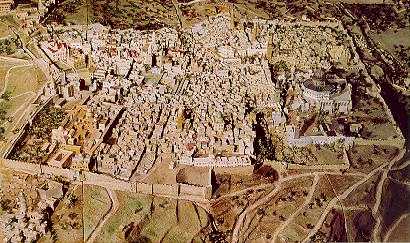Non-Jews that lay siege to Jewish cities: If their intent was financial gain, the
Shabbos laws should not be violated because of them. If their intent was against Jewish
lives, or if they lay siege without any stated intention, or if there is a sense (chush)
that they are coming for Jewish lives, then even before they come - and are only
mobilizing themselves, it is a mitzvah to go out and attack them with weapons of war and
violate the Shabbos laws. And if it is a city located near a border - even if they are
only demanding hay or straw, we attack them and violate the Shabbos, lest they conquer the
city, and because of that conquest it becomes easier for them to conquer the rest of the
land.
There are those (rabbinic authorities) who say, that at this time, when we dwell among
non-Jews who are murderers and slayers, that even if they come only for financial gain, we
violate the Shabbos. Because, if the Jews do not allow them to plunder and pillage, they
will kill us. And it is a chazakah (a given) that no one stands-by idly, when his money is
being stolen. Thus, a thief coming to steal will worry whether his victim will kill him,
so the thief comes from the outset with an intention to kill first. So also, in this case
[where we are dealing with only financial attacks] we violate the Shabbos [to defend
ourselves]. Nevertheless, everything is according to the context. But an individual, that
comes to take money, we allow him to take as much as he wants, and we do not violate the
Shabbos, for this is a case of financial loss only.
Shulchan Oruch HaRav 329:6,7. And almost the same wording can be found
in the Shulchan Oruch of R. Karo, and also in the Mishna Berurah (same siman). See also
Eruvin 45a including the Rashi. The Rambam adds:
It is a mitzvah for every member of the Jewish people who can come
[to their assistance] to go out and aid their brethren who are under siege and save them
from the gentiles [although it is the] Shabbos. It is forbidden to wait until Saturday
night.
After they have saved their brethren, they may return home with their weapons on the
Shabbos, so that a dangerous situation will not be created in the future.
Rambam, Mishna Torah, Hilchot Shabbos, 2:23.
From this we see a couple of things:
- The issue is not land, per. se - it is the saving of Jewish lives.
- An issue of saving Jewish lives is not dependent on location, and applies everywhere and
for all time.
- Relatively minor land or even monetary demands, such as straw or hay, if such a demand
occurs under the threat of physical attack, are considered a case of saving Jewish lives.
- In issues of saving Jewish lives we do not stop and calculate or estimate what the risk
is, we are required to assume the worst scenario and act accordingly.
It should be obvious that since it is a mitzvah to aid our brethren, we should not do
actions that the Shulchan Oruch states would endanger our brethren. Sadly, not all Jewish
people recognize the authority of the Shulchan Oruch, and to our greater grief, there are
those who re-interpret or ignore it (either due to ignorance, or to appear correct in the
eyes of non-Jews, or other reasons).
Irrespective of this, we must work with our fellow Jews, and educate them to this
important issue of saving Jewish lives, and how it applies to the "land for
peace" issue. Most importantly, we must do this in a peaceable manner, for "the
ways of the Torah are peaceful." With a peaceful, patient and understanding approach,
certainly HaShem will aid us and help us to accomplish His will. However, we must be
clear, certain, and confident; and this can only occur when we act according to the
guidance of the Shulchan Oruch, and the teachings of our Rabbis.
 Author: Yechezkal-Shimon Gutfreund
Author: Yechezkal-Shimon Gutfreund
 Many people approach this issue by focusing on the land and territory of
Israel. While, it is certainly true that all of the land of Israel is holy, the Rebbe said
that the issue of "land for peace" is not so much an issue of land per. se. -
but rather an issue of preserving Jewish lives, regardless of location. The Shulchan Oruch
(the Code of Jewish Law) states:
Many people approach this issue by focusing on the land and territory of
Israel. While, it is certainly true that all of the land of Israel is holy, the Rebbe said
that the issue of "land for peace" is not so much an issue of land per. se. -
but rather an issue of preserving Jewish lives, regardless of location. The Shulchan Oruch
(the Code of Jewish Law) states:  Author: Yechezkal-Shimon Gutfreund
Author: Yechezkal-Shimon Gutfreund